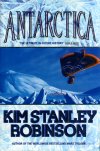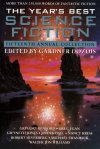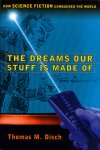 |
REVIEWS
Complete Locus reviews are available in
back issues

Linked titles can be browsed (or ordered) from Amazon.com Books.
|
|
 |
 |
Profiles of Recent Books
from reviews in Locus Magazine
Antarctica, Kim Stanley Robinson (Bantam, July 1998, $24.95, hc) Robinson's follow-up to his landmark Mars trilogy is superficially more of the same: another story of survival in a harsh environment, involving themes of ecology, policy, and utopianism. But this is a major, distinctive work, and it has attracted the attention of no less than three Locus reviewers since its first UK edition last year [lower cover]. Gary K. Wolfe in the September 1997 Locus calls it ''easily one of the best SF novels of the year'' and comments ''much of what it took Robinson three volumes to accomplish in his Mars books is here accomplished in one, and with a tighter and more unified narrative to boot.'' Faren Miller in the same issue is attracted by its ''eloquent sense of place'' -- ''the scenery here packs a tremendous wallop, conveyed so directly the reader is simply there, admist it all, and tempted to chime in along with five of Robinson's travelers when they pause in a vast glacial box canyon and declare: ''Stupendous!'' ''Awesome!''. Russell Letson, in the June 1998 issue, notes ''Its people are full of passion, and they are operating in an environment whose raw sensory impact runs right off the scale. Antarctica, like the Mars trilogy, is about being-in-the-world -- about what kind of life is worth living and how humankind can make a comfortable place for itself in a natural environment.'' (See Robinson's interview from the September 1997 Locus.)
(Wed 8 Jul 98)
|

 |
 |
Darwinia, Robert Charles Wilson (Tor, June 1998, $22.95, hc) A Miracle of 1912 causes all of Europe to be replaced by a strange new world known as Darwinia -- something like what happened in Wilson's previous novel Mysterium -- in which flora and fauna have apparently followed a different evolutionary path. Gary K. Wolfe, in the July 1998 Locus, sees antecedents of this idea in Wilson's Gypsies from 1989, but ''Darwinia is his best, most complex, and most rewarding exploration of this topic yet, an unlikely combination of early twentieth-century exploration-adventure, decades-spanning romantic epic, and cosmic mystery''. Faren Miller, in the June 1998 Locus, sees it as much more than an adventure novel: ''What we get instead is darker, more complex, and ultimately far more moving''. She concludes ''Darwinia is a remarkable book, worthy of the highest honors in our field. Don't miss it.
(Wed 8 Jul 98)
|
The Year's Best Science Fiction: Fifteenth Annual Collection, edited by Gardner Dozois (St. Martin's Griffin, June 1998, $17.95, tpb)
The grand-daddy of annual anthologies includes 28 stories amounting to over 250,000 words. Highlights include Greg Egan's ''Reasons to be Cheerful'', Robert Silverberg's ''Beauty in the Night'', Stephen Baxter's ''Moon Six'', Robert Reed's ''Marrow'', and stories by McAuley, Kress, Marusek, Waldrop, Stableford, Nordley, Landis, Williams, and Benford/Malartre. There's also editor Dozois's comprehensive summation of the year, covering trends in the field, the state of the magazines, the year's novels, collections, and anthologies, and extensive comments on notable SF films of '97. Gary K. Wolfe, in the June 1998 Locus Magazine compares this book to the annual by David G. Hartwell [profiled below] and finds the two of them have done much to ''stimulate debate about the nature and direction of the field''. Says Wolfe, ''Hartwell, whose selections tend to be shorter, more humorous, and more traditional, wants only to celebrate SF. The more cerebral Dozois, on the other hand, wants to dress it up and take it out somewhere.'' Wolfe concludes: ''[A]s usual I'm insisting that you need to get both.''
(Sun 14 Jun)
|
 |
 |
The Dreams Our Stuff Is Made Of: How Science Fiction Conquered the World, Thomas M. Disch (Free Press, May 1998, $25.00, hc)
Esteemed SF author Disch sets out to explain the impact of science fiction on American and global culture. His critique covers the origin of SF (Poe, he claims, not Shelley or Wells); the American tradition of tolerating, even enjoying, liars; religion in SF; feminist SF; and Star Trek, ''the future as lifestyle''. Critic Gary K. Wolfe in the May 1998 Locus compares the book to attacks on the field by mainstream critics, with an abundance of overbroad generalizations, selective illustrations, and a cheerful conflation of literary SF, movie SF, and pseudo-scientific hoaxes and cults. But there is lots of good stuff here, Wolfe admits: ''Much of what Disch says in this book is stimulating; much can and should make some SF readers and writers uncomfortable; much suggests whole areas for further exploration by scholars and critics. At its best, the book is a worthy contribution to the tradition of idiosyncratic in-house critical studies from Blish to Spinrad; at its worst, it's vacuum-cleaner criticism, sucking up all sorts of debris and then dumping it in a jumble for our inspection.''
(Tue 26 May)
|
Previous Profiles:
Jack McDevitt's Moonfall
Patricia Anthony's Flanders
Lois McMaster Bujold's Komarr
Paul J. McAuley's Child of the River
Year's Best SF 3, edited by David G. Hartwell
Nebula Awards 32, edited by Jack Dann
|
 |



